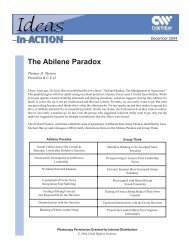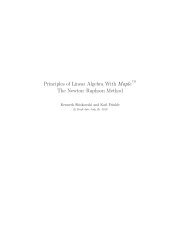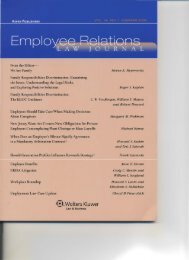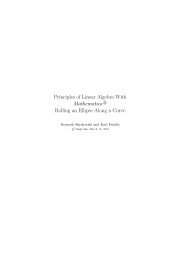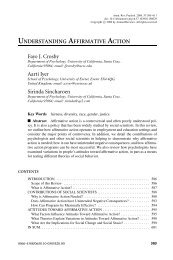Do Nice Guysâand GalsâReally Finish Last - Southeastern ...
Do Nice Guysâand GalsâReally Finish Last - Southeastern ...
Do Nice Guysâand GalsâReally Finish Last - Southeastern ...
You also want an ePaper? Increase the reach of your titles
YUMPU automatically turns print PDFs into web optimized ePapers that Google loves.
18 JUDGE, LIVINGSTON, AND HURST<br />
LePine, J. A., & Van Dyne, L. (1998). Predicting voice behavior in work<br />
groups. Journal of Applied Psychology, 83, 853–868.<br />
Liu, L. A., Friedman, R. A., & Chi, S. (2005). “Ren Qing” versus the “Big<br />
Five”: The role of culturally sensitive measures of individual difference<br />
in distributive negotiations. Management and Organization Review, 1,<br />
225–247. doi:10.1111/j.1740-8784.2005.00010.x<br />
Maume, D. J. (2006). Gender differences in restricting work efforts because<br />
of family responsibilities. Journal of Marriage and Family, 68,<br />
859–869. doi:10.1111/j.1741-3737.2006.00300.x<br />
McCrae, R. R., & Costa, P. T., Jr. (1996). Toward a new generation of<br />
personality theories: Theoretical contexts for the five-factor model. In<br />
J. S. Wiggins (Ed.), The five-factor model of personality: Theoretical<br />
perspectives (pp. 51–87). New York, NY: Guilford Press.<br />
Meier, B. P., & Robinson, M. D. (2004). <strong>Do</strong>es quick to blame mean quick<br />
to anger? The role of agreeableness in dissociating blame and anger.<br />
Personality and Social Psychology Bulletin, 30, 856–867. doi:10.1177/<br />
0146167204264764<br />
Moss-Racusin, C., & Rudman, L. (2010). Disruptions in women’s selfpromotion:<br />
The backlash avoidance model. Psychology of Women Quarterly,<br />
34, 186–202. doi:10.1111/j.1471-6402.2010.01561.x<br />
Mount, M. K., Barrick, M. R., & Stewart, G. L. (1998). Five-factor model<br />
of personality and performance in jobs involving interpersonal interactions.<br />
Human Performance, 11, 145–165.<br />
Mueller, G., & Plug, E. (2006). Estimating the effect of personality on male<br />
and female earnings. Industrial & Labor Relations Review, 60, 3–22.<br />
Nakao, K., & Treas, J. (1992). The 1989 socioeconomic index of occupations:<br />
Construction from the 1989 occupational prestige scores (GSS<br />
Methodological Rep. No. 74). Chicago, IL: National Opinion Research<br />
Center.<br />
Ng, T. W. H., Eby, L. T., Sorensen, K. L., & Feldman, D. C. (2005).<br />
Predictors of objective and subjective career success: A meta-analysis.<br />
Personnel Psychology, 58, 367–408. doi:10.1111/j.1744-6570<br />
.2005.00515.x<br />
Nyhus, E., & Pons, E. (2005). The effects of personality on earnings.<br />
Journal of Economic Psychology, 26, 363–384. doi:10.1016/j<br />
.joep.2004.07.001<br />
Parks-Stamm, E., Heilman, M., & Hearns, K. (2008). Motivated to<br />
penalize: Women’s strategic rejection of successful women. Personality<br />
and Social Psychology Bulletin, 34, 237–247. doi:10.1177/<br />
0146167207310027<br />
Paternoster, R., Brame, R., Mazerolle, P., & Piquero, A. (1998). Using the<br />
correct statistical test for the equality of regression coefficients. Criminology,<br />
36, 859–866. doi:10.1111/j.1745-9125.1998.tb01268.x<br />
Paulhus, D. L., & Trapnell, P. D. (2008). Self-presentation of personality:<br />
An agency-communion framework. In O. P. John, R. W. Robins & L. A.<br />
Pervin (Eds.), Handbook of personality psychology: Theory and research<br />
(3rd ed., pp. 492–517). New York, NY: Guilford Press.<br />
Penner, I. A., <strong>Do</strong>vidio, J. E., Piliavin, J. A., & Schroeder, D. A. (2005).<br />
Prosocial behaviour: Multilevel perspectives. Annual Review of Psychology,<br />
56, 365–392. doi:10.1146/annurev.psych.56.091103.070141<br />
Penner, I. A., Fritzsche, B. A., Caiger, J. P., & Freifeld, T. S. (1995).<br />
Measuring the prosocial personality. Advances in Personality Assessment,<br />
10, 147–163.<br />
Pfeffer, J. (2010). Power: Why some people have it and others don’t. New<br />
York, NY: Harper Collins.<br />
Phelan, J., Moss-Racusin, C., & Rudman, L. (2008). Competent yet out in<br />
the cold: Shifting criteria for hiring reflect backlash toward agentic<br />
women. Psychology of Women Quarterly, 32, 406–413. doi:10.1111/<br />
j.1471-6402.2008.00454.x<br />
Raudenbush, S. W., Bryk, A., Cheong, Y. F., & Congdon, R. (2004).<br />
HLM6: Hierarchical linear and nonlinear modeling. Chicago, IL: Scientific<br />
Software International.<br />
Roberts, B. W., Caspi, A., & Moffitt, T. E. (2003). Work experiences and<br />
personality development in young adulthood. Journal of Personality and<br />
Social Psychology, 84, 582–593. doi:10.1037/0022-3514.84.3.582<br />
Rode, J., Arthaud-Day, M., Mooney, C., Near, J., & Baldwin, T. (2008).<br />
Ability and personality predictors of salary, perceived job success, and<br />
perceived career success in the initial career stage. International Journal<br />
of Selection and Assessment, 16, 292–299. doi:10.1111/j.1468-<br />
2389.2008.00435.x<br />
Rudman, L. A. (1998). Self-promotion as a risk factor for women: The<br />
costs and benefits of counterstereotypical impression management. Journal<br />
of Personality and Social Psychology, 74, 629–645. doi:10.1037/<br />
0022-3514.74.3.629<br />
Rudman, L. A., & Fairchild, K. (2004). Reactions to counterstereotypic<br />
behavior: The role of backlash in cultural stereotype maintenance. Journal<br />
of Personality and Social Psychology, 87, 157–176. doi:10.1037/<br />
0022-3514.87.2.157<br />
Rudman, L., & Glick, P. (1999). Feminized management and backlash<br />
toward agentic women: The hidden costs to women of a kinder, gentler<br />
image of middle managers. Journal of Personality and Social Psychology,<br />
77, 1004–1010. doi:10.1037/0022-3514.77.5.1004<br />
Rudman, L. A., & Glick, P. (2001). Gender effects on social influence and<br />
hireability prescriptive gender stereotypes and backlash toward agentic<br />
women. Journal of Social Issues, 57, 743–762. doi:10.1111/0022-<br />
4537.00239<br />
Rudman, L. A., & Phelan, J. E. (2008). Backlash effects for disconfirming<br />
gender stereotypes in organizations. Research in Organizational Behavior,<br />
28, 61–79. doi:10.1016/j.riob.2008.04.003<br />
Spurk, D., & Abele, A. E. (2010). Who earns more and why? A multiple<br />
mediation model from personality to salary. Journal of Business and<br />
Psychology, 26, 87–103. Retrieved from http://www.springerlink.com/<br />
content/l473277232127746/abstract/. doi:10.1007/s10869-010-9184-3<br />
Srivastava, A., Locke, E. A., & Bartol, K. M. (2001). Money and subjective<br />
well-being: It’s not the money, it’s the motives. Journal of Personality<br />
and Social Psychology, 80, 959–971. doi:10.1037/0022-3514.80.6.959<br />
Thaler, L. K., & Koval, R. (2006). The power of nice: How to conquer the<br />
business world with kindness. New York, NY: <strong>Do</strong>ubleday/Currency.<br />
Tiedens, L. Z. (2001). Anger and advancement versus sadness and subjugation:<br />
The effect of negative emotion expressions on social status<br />
conferral. Journal of Personality & Social Psychology, 80, 86–94.<br />
Twenge, J. M. (2001). Changes in women’s assertiveness in response to<br />
status and roles: A cross-temporal meta-analysis, 1931–1993. Journal of<br />
Personality and Social Psychology, 81, 133–145. doi:10.1037/0022-<br />
3514.81.1.133<br />
Van de Vliert, E., & Euwema, M. C. (1994). Agreeableness and activeness<br />
as components of conflict behavior. Journal of Personality and Social<br />
Psychology, 66, 674–687. doi:10.1037/0022-3514.66.4.674<br />
Vohs, K. D., Mead, N. L., & Goode, M. R. (2008). Merely activating the<br />
concept of money changes personal and interpersonal behavior. Current<br />
Directions in Psychological Science, 17, 208–212. doi:10.1111/j.1467-<br />
8721.2008.00576.x<br />
Weinberger, C., & Kuhn, P. (2010). Changing levels or changing slopes?<br />
The narrowing of the gender earnings gap, 1959–1999. Industrial &<br />
Labor Relations Review, 63, 384–406.<br />
Wiggins, J. S. (1991). Agency and communion as conceptual coordinates<br />
for the understanding and measurement of interpersonal behavior. In<br />
W. M. Grove & D. Ciccetti (Eds.), Thinking clearly about psychology:<br />
Personality and psychopathology (Vol. 2, pp. 89–113). Minneapolis,<br />
MN: University of Minneapolis Press.<br />
Wojciszke, B., & Abele, A. E. (2008). The primacy of communion over<br />
agency and its reversals in evaluations. European Journal of Social<br />
Psychology, 38, 1139–1147.<br />
Received May 24, 2010<br />
Revision received July 27, 2011<br />
Accepted September 21, 2011



